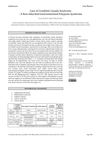 18 citations,
April 2013 in “Inflammatory Bowel Diseases”
18 citations,
April 2013 in “Inflammatory Bowel Diseases” People with Inflammatory Bowel Disease often lose hair due to stress, medication side effects, or lack of nutrients, and treatment depends on the specific cause.
 17 citations,
April 2021 in “Clinical Phytoscience”
17 citations,
April 2021 in “Clinical Phytoscience” Chitrak is a medicinal plant with health benefits like fighting microbes, reducing inflammation, and promoting hair growth, but it can be toxic and needs more research.
 16 citations,
July 2012 in “The New England Journal of Medicine”
16 citations,
July 2012 in “The New England Journal of Medicine” The patient was diagnosed with anorexia nervosa and severe malnutrition, requiring urgent refeeding and monitoring.
 15 citations,
September 2013 in “Pharmaceutical Biology”
15 citations,
September 2013 in “Pharmaceutical Biology” Jujube fruit extract may reduce kidney damage from ibuprofen in rats.
 14 citations,
January 2020 in “Mediterranean Journal of Rheumatology”
14 citations,
January 2020 in “Mediterranean Journal of Rheumatology” New JAK inhibitor drugs show promise for treating skin diseases but need more research on safety and effectiveness.
 12 citations,
May 2017 in “Pharmacology & therapeutics”
12 citations,
May 2017 in “Pharmacology & therapeutics” Targeting immune tolerance issues in Alopecia Areata could restore hair growth and maintain remission.
 9 citations,
July 2002 in “Journal of the European Academy of Dermatology and Venereology”
9 citations,
July 2002 in “Journal of the European Academy of Dermatology and Venereology” The document concludes that fexofenadine reduces inflammation in chronic hives, cholestyramine helps half of pregnant women with itchy rashes, and relaxing incisions are a good alternative in facial surgery for the elderly.
 7 citations,
November 1977 in “JAMA”
7 citations,
November 1977 in “JAMA” A woman got a serious strep infection from an IUD, likely passed from her husband's infected throat during sexual activity.
 3 citations,
July 2018 in “Elsevier eBooks”
3 citations,
July 2018 in “Elsevier eBooks” Erosive pustular dermatosis of the scalp is a rare condition that causes scarring hair loss, mainly in older women, and requires ongoing treatment.
 1 citations,
April 2012 in “Journal of the American Academy of Dermatology”
1 citations,
April 2012 in “Journal of the American Academy of Dermatology” Clofazimine effectively treated a rare skin condition with ash-gray patches.
 October 2019 in “Journal of Evolution of Medical and Dental Sciences”
October 2019 in “Journal of Evolution of Medical and Dental Sciences” A 56-year-old man was diagnosed with Cronkhite-Canada Syndrome after showing symptoms like diarrhea, weight loss, and skin changes.
 January 2017 in “Springer eBooks”
January 2017 in “Springer eBooks” The document concludes that Cutaneous Lupus Erythematosus has different forms, is influenced by genetic and environmental factors, and can be treated with various medications, but more targeted therapies are needed.
 January 2014 in “Springer eBooks”
January 2014 in “Springer eBooks” Inflammasome proteins can indicate the severity and treatment response of various diseases and injuries.
 April 2012 in “Journal of the American Academy of Dermatology”
April 2012 in “Journal of the American Academy of Dermatology” Clofazimine may be effective for treating ashy dermatosis.
 April 2012 in “Journal of the American Academy of Dermatology”
April 2012 in “Journal of the American Academy of Dermatology” Clofazimine successfully treated a man's ashy dermatosis, clearing his skin lesions.
 April 2012 in “Journal of the American Academy of Dermatology”
April 2012 in “Journal of the American Academy of Dermatology” Clofazimine effectively treated ashy dermatosis in a patient.
 305 citations,
July 2016 in “International Journal of Biological Macromolecules”
305 citations,
July 2016 in “International Journal of Biological Macromolecules” Polysaccharides have many health benefits and are used in drugs, but isolating and purifying them is complex and requires careful methods.
 278 citations,
March 2013 in “Gut”
278 citations,
March 2013 in “Gut” Anti-IL-12/IL-23 antibody therapy effectively treats psoriasiform skin lesions in IBD patients.
 254 citations,
September 2014 in “Menopause”
254 citations,
September 2014 in “Menopause” The NAMS 2014 recommendations guide healthcare providers on treating health issues in midlife women, emphasizing individualized care and informed decision-making.
 222 citations,
September 2016 in “JCI insight”
222 citations,
September 2016 in “JCI insight” Tofacitinib is safe and effective for severe alopecia areata, but hair loss may return 2 months after stopping treatment.
 165 citations,
September 2003 in “Toxicology and applied pharmacology”
165 citations,
September 2003 in “Toxicology and applied pharmacology” Blocking COX, especially COX-2, in the skin can reduce inflammation and pain and may help prevent skin cancer.
 151 citations,
November 2018 in “International Journal of Pharmaceutics”
151 citations,
November 2018 in “International Journal of Pharmaceutics” Nanoparticles improve drug delivery through the skin but more research is needed on their long-term effects and skin penetration challenges.
 148 citations,
December 2018 in “Journal of autoimmunity”
148 citations,
December 2018 in “Journal of autoimmunity” Alopecia areata is an autoimmune disease causing patchy hair loss, often with other autoimmune disorders, but its exact causes are unknown.
 135 citations,
December 2015 in “Expert Opinion on Biological Therapy”
135 citations,
December 2015 in “Expert Opinion on Biological Therapy” Exosomes could potentially enhance tissue repair and regeneration with lower rejection risk and easier production than live cell therapies.
 126 citations,
April 2015 in “Clinical, cosmetic and investigational dermatology”
126 citations,
April 2015 in “Clinical, cosmetic and investigational dermatology” Choosing the right patients, using proper techniques, and having thorough knowledge are key to preventing and managing dermal filler complications.
 125 citations,
September 2019 in “Journal of Clinical Immunology”
125 citations,
September 2019 in “Journal of Clinical Immunology” Foxp3 is crucial for regulatory T cell function, and targeting these cells may help treat immune disorders.
 124 citations,
October 2019 in “Frontiers in Immunology”
124 citations,
October 2019 in “Frontiers in Immunology” Janus kinase inhibitors are promising treatments for autoimmune skin diseases like eczema and psoriasis.
 122 citations,
November 1984 in “Journal of the American Academy of Dermatology”
122 citations,
November 1984 in “Journal of the American Academy of Dermatology” No single treatment is consistently effective for alopecia areata, and more research is needed.
 112 citations,
May 2019 in “Pharmacological Research”
112 citations,
May 2019 in “Pharmacological Research” Lignans and neolignans from plants may help protect against various health issues, including cancer and heart disease.
 106 citations,
December 2015 in “Journal of The American Academy of Dermatology”
106 citations,
December 2015 in “Journal of The American Academy of Dermatology” Correct skin biopsy techniques are crucial to avoid misdiagnosis of skin diseases.






























